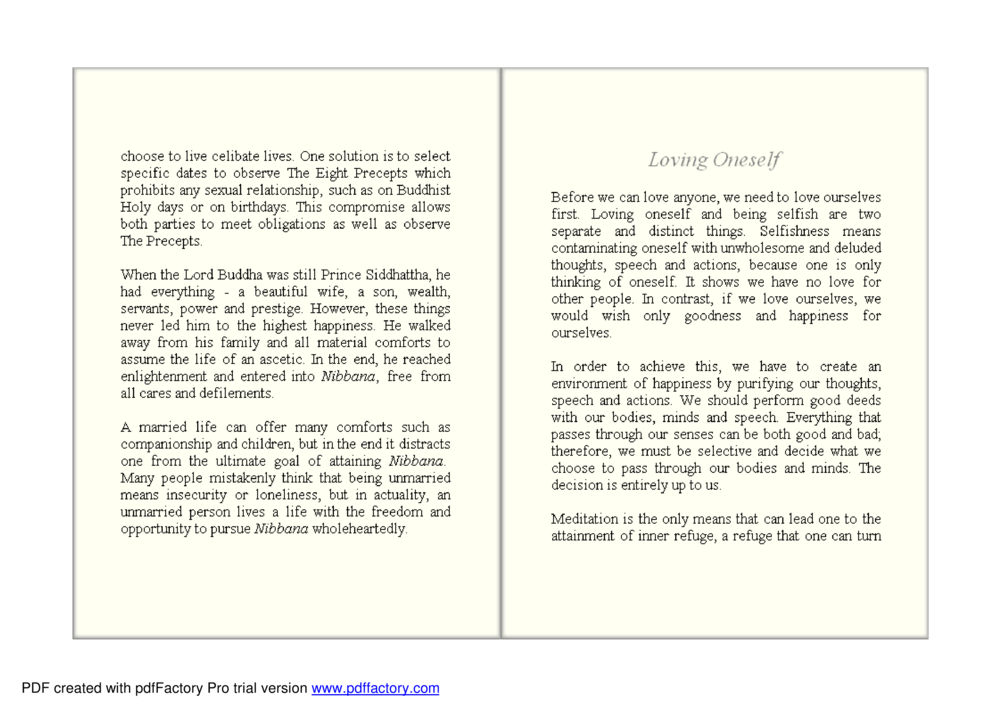Living a Celibate Life and the Journey to Nibbana : หน้า 32/62
Lovely Love : หน้า 32/62 Exploring the concept of celibacy in Buddhism and its connection to achieving Nibbana, alongside the importance of self-love and meditation.
0 ครั้ง

สรุปเนื้อหา
This text discusses the choice of living a celibate life within Buddhism, highlighting how observing The Eight Precepts on certain dates enables individuals to meet their spiritual obligations. It reflects on the life of Prince Siddhattha, who renounced worldly pleasures for enlightenment and Nibbana. The narrative emphasizes that while a married life offers comforts, it can distract from the spiritual goal of attainment. Furthermore, it distinguishes between loving oneself and selfishness, advocating for a meditation practice to purify thoughts and actions, ultimately leading to inner happiness and refuge.
หัวข้อประเด็น
-Celibacy in Buddhism
-Journey to Nibbana
-Love and Self-Acceptance
-The Role of Meditation
-Observance of Precepts
ข้อความต้นฉบับในหน้า
choose to live celibate lives. One solution is to select
specific dates to observe The Eight Precepts which
prohibits any sexual relationship, such as on Buddhist
Holy days or on birthdays. This compromise allows
both parties to meet obligations as well as observe
The Precepts.
When the Lord Buddha was still Prince Siddhattha, he
had everything a beautiful wife, a son, wealth,
servants, power and prestige. However, these things
never led him to the highest happiness. He walked.
away from his family and all material comforts to
assume the life of an ascetic. In the end, he reached
enlightenment and entered into Nibbana, free from
all cares and defilements.
A married life can offer many comforts such as
companionship and children, but in the end it distracts
one from the ultimate goal of attaining Nibbana.
Many people mistakenly think that being unmarried
means insecurity or loneliness, but in actuality, an
unmarried person lives a life with the freedom and
opportunity to pursue Nibbana wholeheartedly.
Loving Oneself
Before we can love anyone, we need to love ourselves
first. Loving oneself and being selfish are two
separate and distinct things. Selfishness means
contaminating oneself with unwholesome and deluded
thoughts, speech and actions, because one is only
thinking of oneself. It shows we have no love for
other people. In contrast, if we love ourselves, we
would wish only goodness and happiness for
ourselves.
In order to achieve this, we have to create an
environment of happiness by purifying our thoughts,
speech and actions. We should perform good deeds
with our bodies, minds and speech. Everything that
passes through our senses can be both good and bad,
therefore, we must be selective and decide what we
choose to pass through our bodies and minds. The
decision is entirely up to us.
Meditation is the only means that can lead one to the
attainment of inner refuge, a refuge that one can turn
PDF created with pdfFactory Pro trial version www.pdffactory.com
หน้าหนังสือทั้งหมด
หนังสือที่เกี่ยวข้อง
Load More






























































